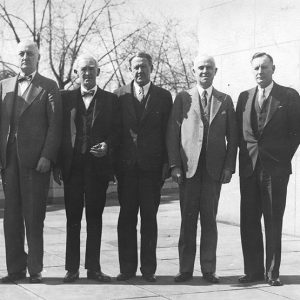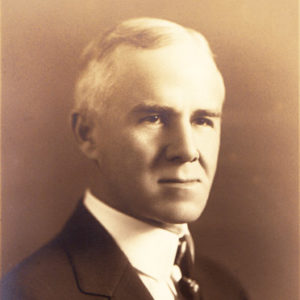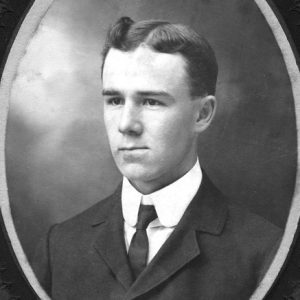calsfoundation@cals.org
Claude Albert Fuller (1876–1968)
Claude Albert Fuller was a noteworthy lawyer, city clerk, state legislator, prosecuting attorney, mayor, and congressman. As mayor, he made many improvements to his city, and as a Democratic congressman, he was a force for improving the lives of those he represented. Among other accomplishments, he was involved with the Social Security Bill and the lakes of northwest Arkansas.
Claude Fuller was born on January 20, 1876, in Springhill, Whiteside County, Illinois, to Wilmont P. Fuller and Maria Ocobock) Fuller. He had a brother and a sister, Harvey and Maude. Fuller’s father, of English ancestry, was a farmer, carpenter, and small contractor. His Pennsylvania Dutch mother was a devout Baptist and insisted the entire family accompany her to Sunday school and church, which was to have a major influence on Fuller for the rest of his life.
In 1885, the Fuller family headed for the boom town of Eureka Springs (Carroll County), the second-largest city in Arkansas at the time. Fuller worked as a boot black and as a janitor at the school where he enrolled. He later dropped out of high school to get a better job in Chicago for a while and saved his money, but in order to achieve his ambition to become a lawyer, he finished high school in Eureka Springs in 1896 at the age of twenty. Upon graduating, he went back to Chicago to attend the Kent School of Law, later returning to Eureka Springs to the law office of C. G. White, where he studied for two years. In those days, neither a college degree nor a law degree was essential for the practice of law.
Following his study with White, Fuller took the bar examination in open court. On February 5, 1898, he was admitted to the bar and became a practicing lawyer.
He married May Obenshain on December 25, 1899. They had three children, one of whom died in infancy.
As a Democrat, Fuller was active in political affairs and, in 1898, was elected city clerk in Eureka Springs, serving until 1902, when he was elected to the Arkansas House of Representatives. He was reelected in 1904, serving until 1906.
Fuller was elected mayor of Eureka Springs in 1906 and served until 1910, building the courthouse in the Western District of Carroll County in Eureka Springs. In 1910, he was elected prosecuting attorney of a district comprising Carroll, Madison, Benton, and Washington counties. He was reelected in 1912.
Fuller supported Charles H. Brough for governor of Arkansas in 1916. Brough had the state prison commission establish a camp for convicts and provided their labor to build a road from Eureka Springs to Seligman, Missouri, which enhanced automobile tourism to the Eureka Springs area.
In 1920, Fuller was again elected mayor and was reelected in 1924, serving until 1928. During that time, he led the building of the city auditorium and the paving of five miles of the city streets.
In 1928, Fuller was elected to the U.S. Congress, serving through reelections from the Seventy-first to the Seventy-sixth Congress (1929–1939). When first elected to Congress, even though during a Republican administration, he was able to secure over $2 million for buildings at the University of Arkansas (UA) in Fayetteville (Washington County), as well as funds for the establishment of the veterans’ hospital in Fayetteville. After Franklin D. Roosevelt’s election in 1932 and a change to a Democratic-controlled Congress, Fuller was influential in electing Henry T. Rainey to the position of Speaker of the House. Rainey appointed Fuller to the powerful Ways and Means Committee, and it was during his tenure on that committee that the Social Security Bill was enacted in 1935. He was also successful in getting passed the Flood Control Act of 1938, which authorized the Corps of Engineers to build dams in the White River basin, resulting in Norfork, Bull Shoals, Table Rock, and Beaver lakes.
Fuller was also appointed a member of the Patronage Committee, on which he served as chairman until he left the House. The committee’s primary responsibility was appointments and jobs; it was a very powerful committee, although it no longer exists.
Leaders in Congress and from northwest Arkansas planned a celebration and parade on July 6, 1934, to honor Fuller on his homecoming to Eureka Springs. The auditorium ceremony was broadcast over loud speakers carrying the speeches to those outside, and to radio stations in Fayetteville and Springfield, Missouri. Attendees included Speaker of the House Henry T. Rainey, U.S. Senator Joe T. Robinson, and Representative Wright Patman of Texas.
In 1938, Fuller was defeated by Clyde Ellis in his reelection bid for Congress in the state primary by 109 votes. He continued to practice law in Eureka Springs and was president of the Bank of Eureka Springs from 1930 until his death on January 8, 1968. He is buried in the Odd Fellows cemetery in Eureka Springs.
For additional information:
Beals, Frank L. Backwoods Baron: The Life Story of Claude Albert Fuller. Wheaton, IL: Morton Publishing Co., 1951.
Logan, Coy. Audiotape Interview with Claude Albert Fuller. Heritage Center Museum, Berryville, Arkansas.
National Cyclopedia of American Biography. Clifton, NJ: James T. White & Co. 1973.
John Fuller Cross
Eureka Springs, Arkansas
 Congressional Delegation, 1934
Congressional Delegation, 1934  Claude Fuller
Claude Fuller  Claude Fuller
Claude Fuller 




Claude is my paternal grandfather’s uncle on his mother’s side. Maude Fuller Parkhill is my great-grandmother. Roy Fuller Parkhill, her son, is my grandfather. “Fuller” has been used as a middle name for my uncle and for my brother. I hope this information helps someone.